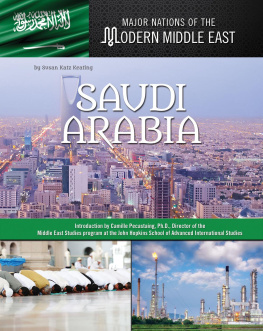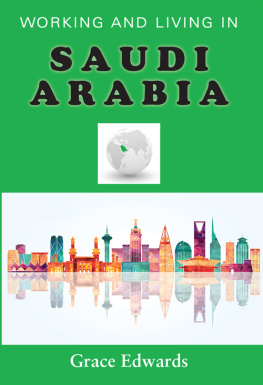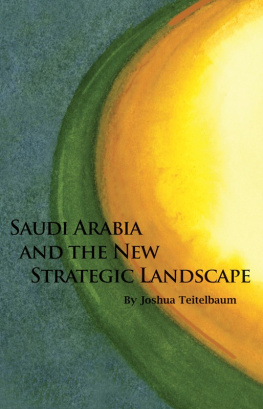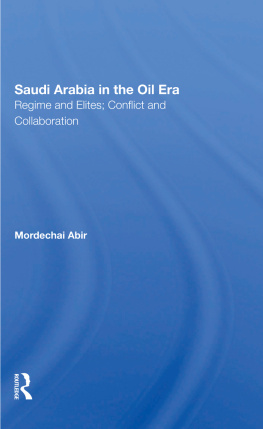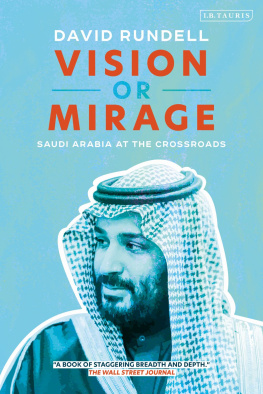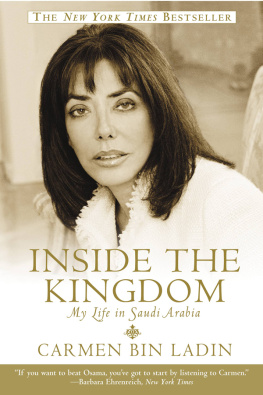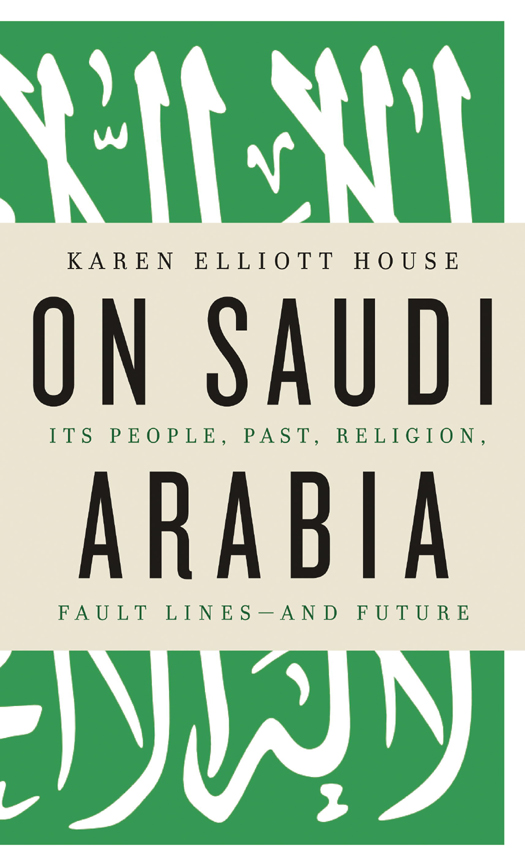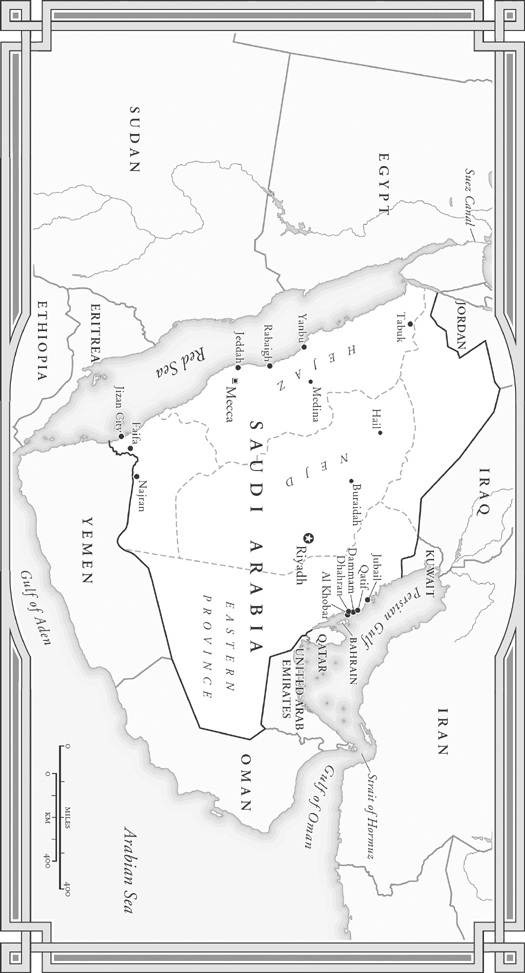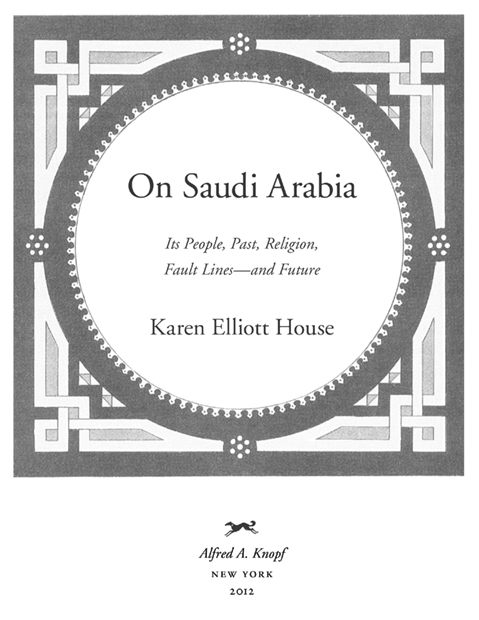Karen Elliott House - On Saudi Arabia: Its People, Past, Religion, Fault Lines - and Future
Here you can read online Karen Elliott House - On Saudi Arabia: Its People, Past, Religion, Fault Lines - and Future full text of the book (entire story) in english for free. Download pdf and epub, get meaning, cover and reviews about this ebook. year: 2012, publisher: Knopf, genre: Politics. Description of the work, (preface) as well as reviews are available. Best literature library LitArk.com created for fans of good reading and offers a wide selection of genres:
Romance novel
Science fiction
Adventure
Detective
Science
History
Home and family
Prose
Art
Politics
Computer
Non-fiction
Religion
Business
Children
Humor
Choose a favorite category and find really read worthwhile books. Enjoy immersion in the world of imagination, feel the emotions of the characters or learn something new for yourself, make an fascinating discovery.

- Book:On Saudi Arabia: Its People, Past, Religion, Fault Lines - and Future
- Author:
- Publisher:Knopf
- Genre:
- Year:2012
- Rating:4 / 5
- Favourites:Add to favourites
- Your mark:
On Saudi Arabia: Its People, Past, Religion, Fault Lines - and Future: summary, description and annotation
We offer to read an annotation, description, summary or preface (depends on what the author of the book "On Saudi Arabia: Its People, Past, Religion, Fault Lines - and Future" wrote himself). If you haven't found the necessary information about the book — write in the comments, we will try to find it.
From the Pulitzer Prizewinning reporter who has spent the last thirty years writing about Saudi Arabiaas diplomatic correspondent, foreign editor, and then publisher of TheWall Street Journalan important and timely book that explores all facets of life in this shrouded Kingdom: its tribal past, its complicated present, its precarious future.
Through observation, anecdote, extensive interviews, and analysis Karen Elliot House navigates the maze in which Saudi citizens find themselves trapped and reveals the mysterious nation that is the worlds largest exporter of oil, critical to global stability, and a source of Islamic terrorists.
In her probing and sharp-eyed portrait, we see Saudi Arabia, one of the last absolute monarchies in the world, considered to be the final bulwark against revolution in the region, as threatened by multiple fissures and forces, its levers of power controlled by a handful of elderly Al Saud princes with an average age of 77 years and an extended family of some 7,000 princes. Yet at least 60 percent of the increasingly restive population they rule is under the age of 20.
The author writes that oil-rich Saudi Arabia has become a rundown welfare state. The public pays no taxes; gets free education and health care; and receives subsidized water, electricity, and energy (a gallon of gasoline is cheaper in the Kingdom than a bottle of water), with its petrodollars buying less and less loyalty. House makes clear that the royal family also uses Islams requirement of obedience to Allahand by extension to earthly rulersto perpetuate Al Saud rule.
Behind the Saudi facade of order and obedience, todays Saudi youth, frustrated by social conformity, are reaching out to one another and to a wider world beyond their cloistered country. Some 50 percent of Saudi youth is on the Internet; 5.1 million Saudis are on Facebook.
To write this book, the author interviewed most of the key members of the very private royal family. She writes about King Abdullahs modest efforts to relax some of the kingdoms most oppressive social restrictions; women are now allowed to acquire photo ID cards, finally giving them an identity independent from their male guardians, and are newly able to register their own businesses but are still forbidden to drive and are barred from most jobs.
With extraordinary access to Saudisfrom key religious leaders and dissident imams to women at university and impoverished widows, from government officials and political dissidents to young successful Saudis and those who chose the path of terrorismHouse argues that most Saudis do not want democracy but seek change nevertheless; they want a government that provides basic services without subjecting citizens to the indignity of begging princes for handouts; a government less corrupt and more transparent in how it spends hundreds of billions of annual oil revenue; a kingdom ruled by law, not royal whim.
In Houses assessment of Saudi Arabias future, she compares the country today to the Soviet Union before Mikhail Gorbachev arrived with reform policies that proved too little too late after decades of stagnation under one aged and infirm Soviet leader after another. She discusses what the next generation of royal princes might bring and the choices the kingdom faces: continued economic and social stultification with growing risk of instability, or an opening of society to individual initiative and enterprise with the risk that this, too, undermines the Al Saud hold on power.
A riveting bookinformed, authoritative, illuminatingabout a country that could well be on the brink, and an in-depth examination of what all this portends for Saudi Arabias future, and for our own.
Karen Elliott House: author's other books
Who wrote On Saudi Arabia: Its People, Past, Religion, Fault Lines - and Future? Find out the surname, the name of the author of the book and a list of all author's works by series.

